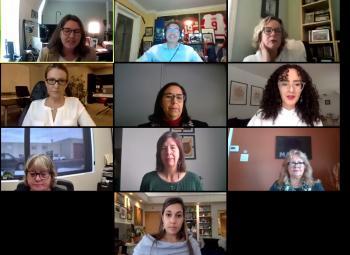Summary
Local Journalism Initiative Reporter
Windspeaker.com
The Canadian government has a marketplace worth an estimated $25 billion each year.
And though it can be a difficult market to break into, countless businesses can benefit from many lucrative opportunities.
This includes the businesses of five Indigenous women entrepreneurs who were on a panel this past Wednesday to discuss their stories, including the successes and challenges of landing contracts with the federal government.
The event was organized by the Native Women’s Association of Canada (NWAC) and its entrepreneurial outreach and navigation program called #BeTheDrum.
The speakers’ panel, which was held online, was titled How We’re Doing Business with the Government of Canada.
Sylvie Ouellette, president and co-founder of Versatil: Business Intelligence and Performance Management, started her company in 2010 in the Quebec city of Gatineau.
Ottawa, the Canadian capital, is directly across a river from Gatineau.
“So definitely we wanted to see how we could do business with the federal government,” said Ouellette. Her company specializes in data management, business analytics, security and AI intelligence. “This is a big employer here.”
Ouellette said simply having the desire to land federal contracts is not sufficient. In order to secure some government deals, previous experience working for the Canadian government is required. This experience can only be obtained through partnerships.
“It took us many years to be able to bid on a contract because we had to work with other companies first to get the experience so we could have our own references so that we could bid,” Ouellette said.
“It’s complex, even if it’s small amounts.”
Julie Lepage, the co-founder of Montreal-based Acosys Consulting Services, said she knew as early as when a business plan was being worked on that federal contracts were worth pursuing.
“We saw there was so much potential in doing business with the government that we couldn’t ignore it,” she said.
Acosys Consulting Services will be celebrating its 15th year in business this coming February.
Winning some federal work though was not an easy path to navigate. Lepage attended numerous workshops and conferences in order to gather information on how the procurement system works for Indigenous entrepreneurs.
“That was hard because we were meeting people who were in (in other industries) and they were getting contracts faster,” Lepage said. “For us it was hard because $10,000 in consulting services is nothing. It keeps us employed maybe for a month. It was a puzzle or problem we had to resolve.”
Lepage said it took at least four years before Acosys Consulting Services even submitted its first bid to the federal government. And it took until 2018 for the business to secure its first long-term contract from the Canadian government.
Her company quickly learned that it’s best to hire an expert in a particular field to assist with a bid proposal, Lepage said.
While hiring another individual will result in additional expenses, it can be fruitful if a noteworthy contract is secured.
After years of gaining experience in what federal officials are looking for in bid submissions, Lepage and her partner now handle the work on their own.
“We learned and now we don’t hire anybody else,” she said. “We know how to answer all of these things.”
Wendy Roberts is the president of Ottawa-based Makwa Resources, which specializes in human resources and program development with both public and private sectors.
Makwa Resources started 15 years ago and Roberts said in the early years her company also had to rely on big partnerships to secure contracts with the federal government. But now it lands its own deals.
“There’s a lot of positive energy that’s floating around,” she said, adding she’s hoping to win a number of contracts prior to the Christmas season. “We’re finding more and more with our government clients that they are listening more. It’s been a very positive reinforcement for us.”
As for Janice Larocque, who is Métis and living in Calgary, she is the president and owner of a pair of staffing companies, Fast Labour Solutions and Spirit Omega.
Playing by the government’s rules has kept her busy.
“Partnerships can work but it does take a while,” she said. “So, if that’s what we need to do to advance, I think we should.”
Larocque said she’s had plenty of discussions with those in her industry and a common thought is why there is a need to partner if a business has the capacity to provide a service on its own.
“I really think if we start pushing, we don’t have to partner to deliver our services,” she said.
Genevieve Cumpson is president of Drapeau Automatic Sprinkler Corp., a leading independent designer and installer of fixed fire protection and detection systems based in Kingston, Ont.
“In our industry we’re so regulated with our codes that the government also has to be regulated so we kind of fit together,” Cumpson said. “We’re just very fortunate that we were finally able to be certified as an Aboriginal business.”
Cumpson said landing federal contracts has proven beneficial for her company when seeking other work.
“For us, working with the government has really actually helped us learn how to put proposals together because they required so much information,” she said. “Sometimes with our private companies we were able to bombard them because we had our structures already set up.”
Local Journalism Initiative Reporters are supported by a financial contribution made by the Government of Canada.

